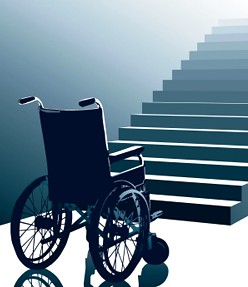A Way with Words for Disability

It is important to maintain natural language when interacting with people with disabilities. Some common usages are encouraged by the World Health Organization. Useful short definitions are:
- impairment – the functional damage
- disability – the restriction of normal activities
- handicap – the resulting social disadvantage
Fuller descriptions are:
Impairment
This denotes any loss or abnormality of bodily function, whether physiological, psychological or anatomical.
This can include brain lesions, loss of a limb or damage to or malfunction of organs. When speaking of impairment, the accent is on the organic or medical problem.
Disability
Generally, a disability is a restriction or lack of ability to perform an activity in a normal manner, resulting from an impairment. The emphasis is on the practical problems faced in the performance of activities.
Handicap
Handicaps are the social, behavioural and psychological consequences of disabilities. They are the disadvantages facing the individual resulting from an impairment or disability which limits or prevents them from fulfilling a normal social role of someone of their age, sex and culture. The Disability Discrimination Act 1992 (DDA) and the Disability Services Act 1986 (DSA) provide the legislative environment in which services to people with disabilities are delivered. Providers of goods and services should be familiar with their provisions.
When talking about people with disabilities, please keep in mind the following guidelines which promote the fair and accurate portrayal of people with disabilities.
In summary:
Avoid stereotypical or stigmatising depictions of people with disabilities.
Avoid phrases and words that demean individuals with disabilities.
Promote the “people first” concept, i.e. not “disabled person” but “person with a disability”.
Portray people with disabilities in the same multidimensional fashion as others.
A Way with Words
Words to Watch | Acceptable Alternative | ||
|
| ||
|
| ||
|
| ||
|
| ||
|
| ||
|
| ||
|
| ||
|
| ||
|
| ||
|
| ||
|
| ||
|
| ||
|
| ||
|
| ||
|
| ||
|
| ||
|
| ||
|
| ||
|
| ||
|
| ||
|
| ||
| Taken from “A Way With Words” (1995), Community Disability Alliance, Department of Families, Youth and Community Care and Department | |||
For More Details:http://www.openroad.net.au/access/dakit/disaware/handout2.htm